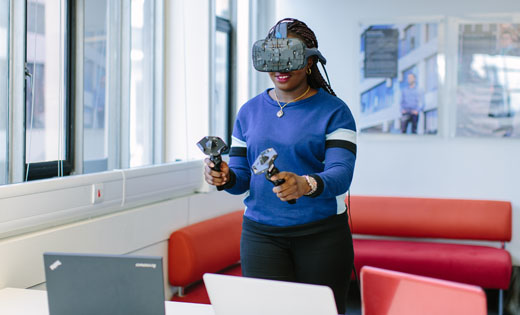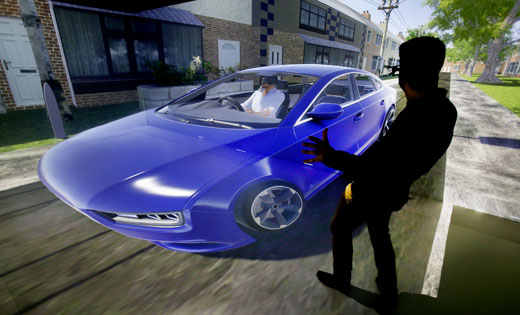Learn more about our new Centre for Immersive Technologies
Academic colleagues working with immersive technologies are invited to discover how the likes of Virtual Reality (VR) and Augmented Reality (AR) can further help their research and education activity.
One of the aims of the new Centre is to boost the education of schoolchildren through VR learning experiences

Our new Centre for Immersive Technologies is officially launched today (Thursday 13 June), harnessing their power to upskill the next generation and push the boundaries of possibilities in research and education.
Working alongside public and private sector partners, the Centre aims to create positive changes across society.
More than 80 researchers from a range of subjects at Leeds, including engineering, arts, humanities and social sciences, will focus on five priority areas – health, transport, education, productivity and culture.
The centre is being coordinated through six academic leads and has a poet and two ‘artists in residence’.
And academics across the University are encouraged to collaborate with the team behind the exciting new venture.
Professor Mark Mon-Williams, Centre Director, and his colleague in the School of Psychology, Associate Director Dr Faisal Mushtaq, are keen to emphasise that the raison d'être of the new Centre is to support all the great research happening across the eight Faculties at Leeds.
Professor Mon-Williams said: "We do hope that any academics who are working with immersive technologies, or who would like to learn more about how these technologies can help their research and education activity, will get in touch.
“Leeds is establishing itself as the UK's leading Immersive Technologies University and our goal is to make sure this ambition benefits the whole academic and student community.”
 Virtual reality (VR) is becoming the new normal at Leeds
Virtual reality (VR) is becoming the new normal at Leeds
Immersive technologies become the new reality at Leeds
Coleman Fung, VR entrepreneur and founder of the Fung Institute for Engineering Leadership at the University of California, Berkeley, is giving a keynote speech at today’s launch.
He said: “Immersive technologies have enormous potential beyond gaming. They will revolutionise the ways we engage with one another and the world around us. How we learn and work, how we experience arts and sports events, how we take care of each other, how we inspire and motivate kids and, most important of all, how we improve lives.
“To realise all these possibilities, we need co-investments and collaborations from academia, governments and industry. Therefore, it’s tremendous Leeds is taking the lead on this pioneering effort with the research Centre.”
Professor Mon-Williams added: “Immersive technologies are a game-changer that will impact on every area of our lives, transforming how we live, work and play.
“This new Centre will help ensure the next technological revolution is harnessed for the benefit of society. By working with a wide range of partners, from technology companies and hospitals to museums, we are ensuring the work carried out by researchers in Leeds is making a real difference to the world.”
 Virtuocity’s new Highly Immersive Kinematic Experimental Research (HIKER) lab – the largest 4K resolution pedestrian simulator in the world. This image and the homepage photo courtesy of Lorne Campbell, Guzelian
Virtuocity’s new Highly Immersive Kinematic Experimental Research (HIKER) lab – the largest 4K resolution pedestrian simulator in the world. This image and the homepage photo courtesy of Lorne Campbell, Guzelian
World-class facilities
Virtuocity will form a key facility for the Centre for Immersive Technologies. Already home to our driving and truck simulators, Virtuocity uses immersive VR to conduct research that can improve the design of urban transport and city systems.
Unveiled today as part of the Centre launch is Virtuocity’s new Highly Immersive Kinematic Experimental Research (HIKER) lab – the largest 4K resolution pedestrian simulator in the world.
The HIKER lab allows participants to interact with virtual urban environments and vehicles without the need to wear any VR equipment. Virtuocity’s three simulation laboratories – driving, truck and pedestrian – will be connected to create a single ‘multi-player’ environment, enabling researchers to address complex questions, including how driverless vehicles will interact with their passengers and with pedestrians.
Professor Richard Romano, Chair in Driving Simulation and academic lead for Virtuocity at Leeds, said: “Immersive technologies are already at the heart of a range of our research. As part of the new centre, Virtuocity provides the technology and expertise to explore and test real-world scenarios using human-centred design methods to inform the future of urban mobility, transport and city planning.”
Breadth of research
In addition to the future of transport, highlights of the Centre include:
- improving healthcare delivery through autonomous robots, training surgeons in developing countries using VR and using robotics to help speed up rehabilitation following accidents and stroke
- boosting the education of schoolchildren through VR learning experiences, and training the next generation of healthcare professionals through immersive education tools
- collaborating with schools, museums and artists to give people access to cultural resources that are beyond public reach, including the Virtual Holocaust Memoryscapes project, forging new connections between the past and the present; and
- encouraging environmentally-friendly lifestyles through immersive technology, letting decision-makers virtually experience the outcomes of difficult choices, and helping companies produce virtual prototypes to accelerate product testing and design.
The Centre for Immersive Technologies will be based within the Leeds Institute for Data Analytics. It will help connect world-leading researchers with partners from the public and private sectors to accelerate innovation and place people at the heart of the new immersive technology revolution.
In addition to the academics who have joined the Centre, two ‘artists in residence’ have been appointed – Christophe DeBezenac and Dave Lynch – and a poet, Dr Kate Fox, who recently completed her PhD at Leeds. Their goal is to spark conversations between different practices, prompting researchers to ask critical questions and take fresh approaches, while the artists are inspired to create exciting new pieces of work.
The scope of the new Centre includes the application of a variety of immersive technologies, including virtual, augmented and mixed reality.
Contact the Centre for Immersive Technologies to find out more about working with its researchers.
Posted in: University newsResearch and innovation